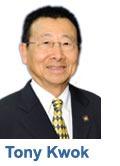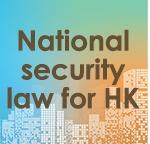Tony Kwok says that the government must take steps to win votes for pro-establishment candidates, starting with reaching zero COVID-19 infections, and revamping system to facilitate greater voter participation

We must learn from history. In 2003, after the severe acute respiratory syndrome (SARS) outbreak, resulting in the then-unprecedented economic recession and record-high unemployment, the pro-establishment candidates suffered a humiliating defeat in the same year's District Council (DC) polls. The reason is simple, people put the blame on the government's incompetence in dealing with SARS by casting their votes for the opposition.
READ MORE: LegCo approves HK$550m in funds for Lantau project studies
Would history repeat itself in the next Legislative Council election in September? As things now stand, this is highly likely. The government has so far failed to effectively contain the pandemic. The dual threat of the pandemic and the inevitable worsening economic recession to follow will undoubtedly induce vociferous public resentment. Such a tense atmosphere of public discontent will not bode well for pro-establishment candidates.
There is also the distinct possibility that the mass resignation of former opposition LegCo members following the passage of the National Security Law for Hong Kong and the dismissal of four opposition LegCo members would generate sympathy votes for the opposition candidates
There is also the distinct possibility that the mass resignation of former opposition LegCo members following the passage of the National Security Law for Hong Kong and the dismissal of four opposition LegCo members would generate sympathy votes for the opposition candidates. As can be seen from the DC election last year, the opposition has a phenomenal ability to marshal resources and support through social media and their strong base among certain media and education sectors.
The coming LegCo election can have a catastrophic effect on the future politics of Hong Kong. The opposition had already threatened that if they commanded a majority in LegCo, they would recklessly vote down all government bills and public funding applications as well as the annual finance budget, with a view to bringing down the government. The result would be that vital public infrastructure projects would be delayed, thereby incurring billions of dollars in extra cost from inflation and painful delays to the projects. Although this scenario is not likely to be repeated, thanks to the welcome restraints of the National Security Law, the opposition can still cause significant disruption to the efficient operation of LegCo if they win the next election.
ALSO READ: LegCo endorses appointment of Lord Hodge to HK's top court
Secondly, a significant win by the opposition would pose an immediate threat to the election of the chief executive in 2022 as this means bestowing on them the potential power of a kingmaker in the selection of the future leader of the SAR.
With the LegCo election less than nine months away, we should have an urgent master plan to guard against the worst possible eventualities. First and foremost, the SAR government must undertake resolute action to achieve "zero local infections" of COVID-19 as soon as possible, to allow time for the Hong Kong economy to recover before the LegCo election. The realistic deadline should not be later than the Chinese New Year on Feb 12. There are already loud public ramblings for being forced to remain at home during the Christmas holidays. To have to continue to suffer the lockdown during the Chinese Lunar New Year could be the last straw leading to a collapse of public support for the government!
Given the disquieting trend of the new infections from unknown sources ranging from 20-30 per day in recent weeks, this means there are far too many unknown infected persons wandering around in the community. It's increasingly clear that this goal would be out of reach unless drastic steps are taken soon. The obvious last-ditch effort that we can no longer put off is universal mandatory testing of all residents to identify all the infected cases once and for all. This must be employed together with the plugging of all loopholes in our current quarantine regime, both internally and externally. This strategy has worked brilliantly even in big cities on the Chinese mainland such as Beijing and Qingdao, which have a much larger population than Hong Kong.
The SAR government should stop making flimsy excuses to avoid introducing this harsh but fail-proof method to identify all sources of new infections. In fact, this is highly doable if it were to mobilize all its 180,000 civil servants, many of them now idling at home. The government would be within its right to invoke in a wartime appeal to all its employees to help out in this unprecedented emergency. Should there be a need, no doubt the central government would be forthcoming with logistic support. If carefully planned and strictly enforced, there is no reason why the universal mandatory testing cannot be completed within a week, as had been done in mainland cities with larger populations. I am sure the public would understand if total or partial lockdowns have to be enforced provided they are assured that, should they cooperate, they would be able to celebrate the Chinese New Year and engage in their family reunion gatherings.
Simultaneously, a citywide vaccination program should be conducted promptly supported by a vigorous positive publicity campaign. Public education is tremendously important as it is obvious the opposition is mounting an anti-vaccination propaganda campaign as shown in places where both fake and social media are active, and doubts are being cast on the safety and usefulness of the vaccine. We are not immune to this negative influence, even from a most respectable source. Indeed, top medical consultant Professor Yuen Kwok-yung has been saying publicly that he would not accept vaccination for at least a year! The sooner his name is struck off the government expert list of advisers the better! The government must learn the lesson on the failure of the extradition bill to ensure an effective publicity war against the opposition. Furthermore, priority for vaccination should not be limited to the elderly and medical and health workers, but also those who can help expedite economic recovery, such as those who need to travel to the mainland for business as well as those working in high-risk business premises such as restaurants, bars, and travel industries, etc., so that these premises can be reopened for business as soon as possible to reinvigorate the economy.
The other priority the government must work hard on is to improve the voting system. In the last DC election, the pro-establishment candidates got 41 percent of the votes against the 52 percent the opposition got. The crucial difference can be the one million voters who did not turn out to vote. It is believed that many of the elderly were deterred from voting because of the long queues formed by continuous queuing by the opposition activists as well as those who are residing on the mainland. The government should immediately revise the voting system to enable postal voting or set up polling stations in Guangdong province, as well as facilitate courtesy queues for the elderly at local polling stations. There is no excuse for the government or the Election Commission not to implement these changes as they are international practices in most Western countries.
Finally, the current legislators should work hard with the financial secretary on the coming budget to address those pressing issues affecting people's livelihood and well-being, such as unaffordable housing, aging population, middle-class anxiety and stagnant upward social mobility for young people, to come up with innovative solutions, so that they can see a positive future in Hong Kong for themselves.
LegCo rules should be amended in time to bar filibustering and willful procedural obstructionism and disorderly conduct to ensure no newly elected opposition members may abuse their position to hamper the normal functioning of the council.
The pro-establishment camp should now start selecting the best candidates for each constituency, be united and start promoting the candidates for the election, and at the same time, launch a major voter registration campaign, in particular targeting the newly arrived immigrants from the mainland.
And then there is the elephant in the room - the ultimate goal of universal suffrage. As long as this is not available, many voters, particularly the young ones, would be trending to the opposition! The central government can consider reintroducing the previous package with some adjustments on the formation of the election committee with a view to giving one person one vote in the election of the chief executive in 2022. This would certainly encourage the politically neutral to back the government at the polls.
Many believe that the opposition has a central command and a very sophisticated PR and publicity set-up, as can be shown in their marshaling of public opposition against the government when it attempted to introduce the extradition bill. The opposition was able to flood both the traditional and social media with professionally produced slick videos. The government and the pro-establishment camp must be equally adept in promoting their message and candidates. They should consider setting up a unified command structure to unify both their message and manpower deployment for effective counter publicity. There is no time to waste and they must act decisively now!
The author is an adjunct professor of HKU Space, and a council member of the Chinese Association of Hong Kong and Macao Studies. He is also a former deputy commissioner of ICAC and an international anti-corruption consultant.
The views do not necessarily reflect those of China Daily.



